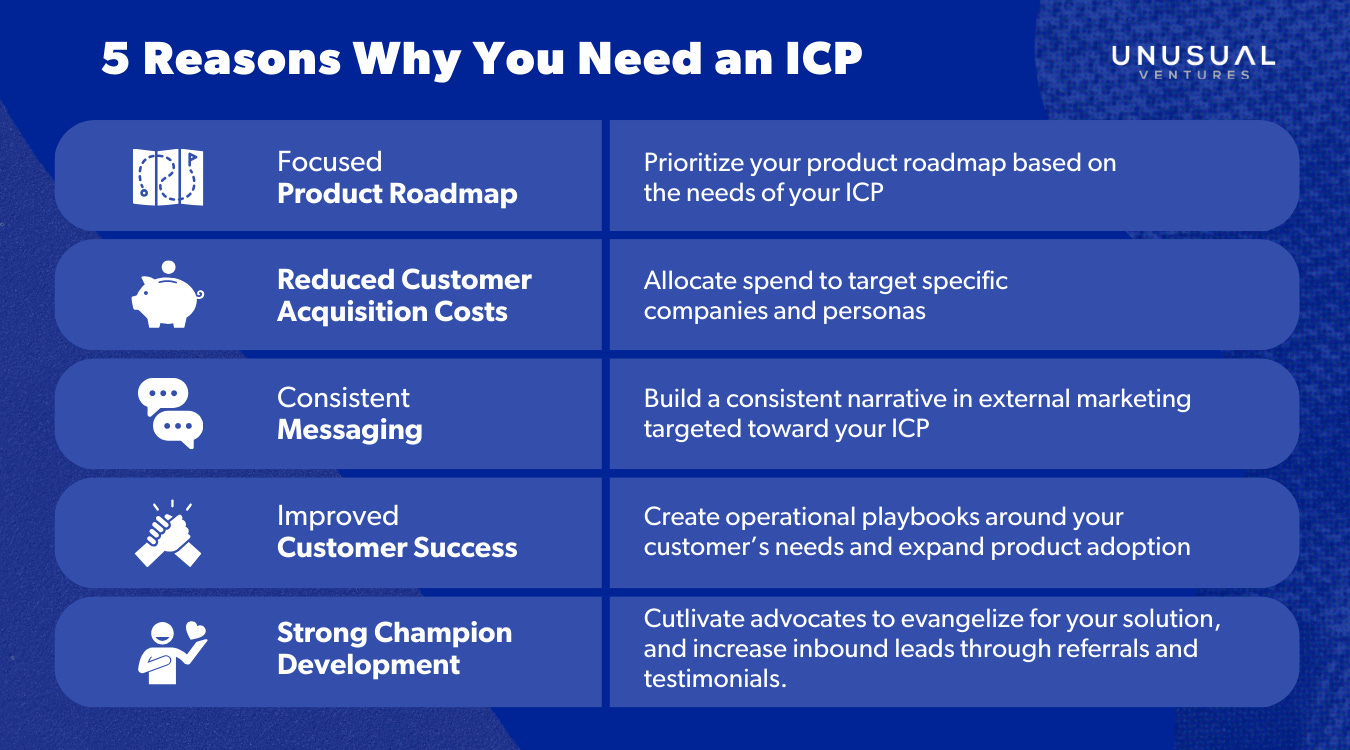Why defining your startup's ICP is important
Defining your ICP can help you better identify customer needs.
The Importance of Defining Your Ideal Customer Profile (ICP) for Startups
As an early-stage startup, the excitement of landing any customer can be overwhelming. However, not taking the time to clearly define your Ideal Customer Profile (ICP) can lead to significant challenges both in the short-term and long-term.
Here’s why focusing on your ICP is crucial and how to develop one that sets you up for success.
Why Defining an ICP Matters
Immediate Benefits:
Startups that skip defining an ICP often struggle to hit critical revenue milestones. This can hurt future fundraising efforts. Imagine a scenario where you have moderate success without a clear ICP but later face high customer churn and difficulty acquiring new customers because your product isn’t tailored to the right audience.

Long-Term Advantages:
A well-defined ICP means you’re focusing on customers who truly benefit from your product. This helps in identifying their needs accurately and prioritizing your team’s efforts. For example, if you’re a SaaS startup targeting small businesses, knowing your ICP helps you avoid wasting time on enterprise clients who require features you’re not equipped to build.
Steps to Develop Your ICP
Identify Key Personas:
Understanding your user and buyer personas is crucial. These personas represent different types of people who will use and buy your product. For instance:
User Persona: A 35-year-old marketing manager in a small business who needs an efficient tool to manage social media campaigns.
Buyer Persona: A 45-year-old small business owner who makes purchasing decisions based on cost-effectiveness and ease of use.
Disqualify Non-Ideal Customers:
Equally important is identifying who your anti-personas are. These are the customer types that don’t fit your product and are unlikely to find value in it. For example, a B2B startup in the creator payments space might find that creative agencies don’t derive enough value from their product and should be excluded from their ICP.
Ask the Right Questions:
When qualifying potential customers, ask questions that help determine if they fit your ICP. These questions should uncover their pain points, current solutions, and how your product can provide a better solution. For example:
What’s your biggest challenge with managing social media campaigns?
How does this challenge impact your daily operations?
What solutions have you tried before, and why didn’t they work?
Creating a Comprehensive Customer Profile

A customer profile should go beyond basic demographics. It should include various data points that help you understand how your ideal customer interacts with your brand. Here’s how to create a detailed customer profile:
Use Customer Profile Templates:
Save time by using pre-built templates that allow you to quickly plug in customer data.
Identify Customer Pain Points:
Understand the common challenges your customers face and how your product addresses these issues. For instance, if you’re selling project management software, common pain points might include disorganized workflows and missed deadlines.
Determine Common Demographics and Behaviors:
Look for shared characteristics among your customers to better target your marketing efforts. For example, you might find that your best customers are mid-sized tech companies with remote teams.
Gather and Analyze Feedback:
Use surveys, interviews, focus groups, and social listening to collect qualitative and quantitative data about your customers. For example, feedback from a customer survey might reveal that users love your product’s simplicity but wish it had better integration with other tools they use.
Integrate Data Across Tools:
Utilize a Customer Relationship Management (CRM) system to track and analyze customer data, continuously refining your profiles. A good CRM helps you collect data like name, location, purchase history, and interaction history, providing a holistic view of your customer base.
The Role of CRM in Refining Your ICP
A robust CRM system is instrumental in collecting and analyzing customer data. By tracking interactions, feedback, and demographic information, a CRM helps you refine your customer profiles over time. This continuous improvement process ensures that your ICP remains accurate and relevant as your startup grows and evolves.

Defining your ICP is not a one-time task but an ongoing process that requires continuous refinement. By staying focused on your ICP, startups can create a repeatable process for acquiring high-value customers, driving sustainable growth. Understanding and addressing the needs of your ideal customers helps build a loyal customer base and scale effectively in a competitive market.




